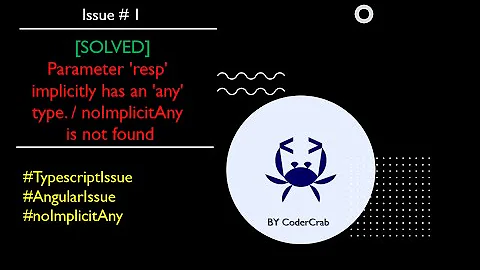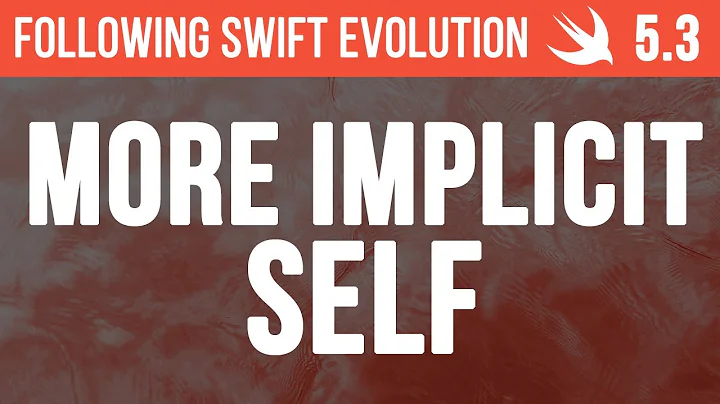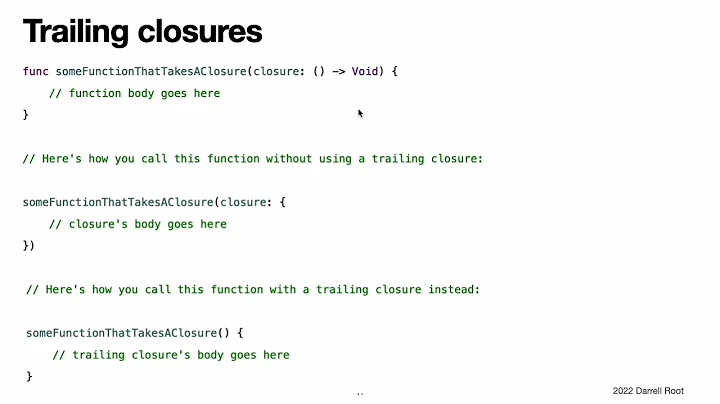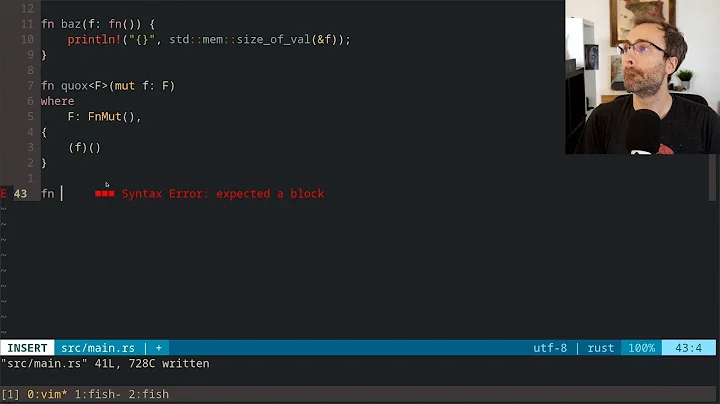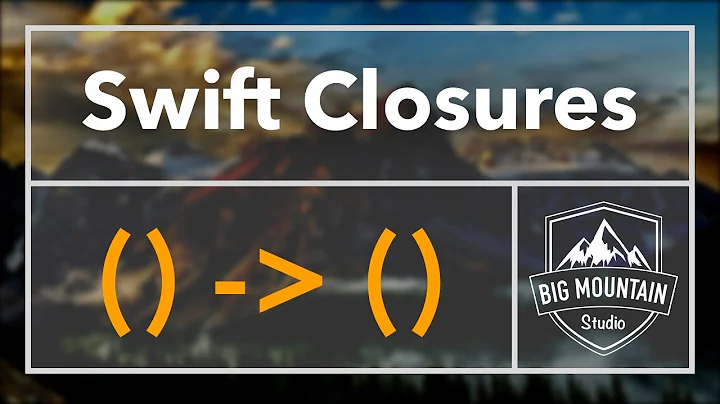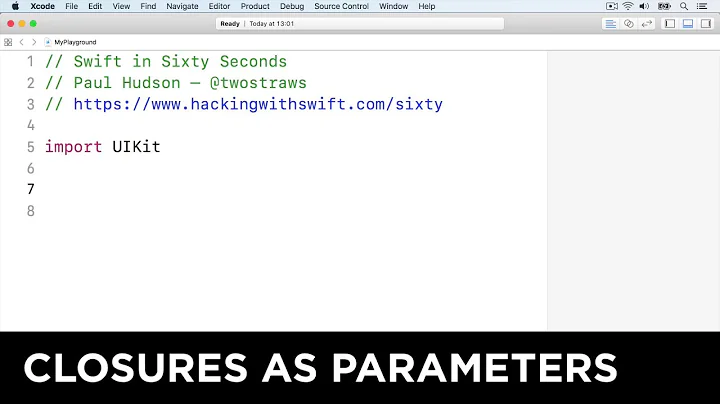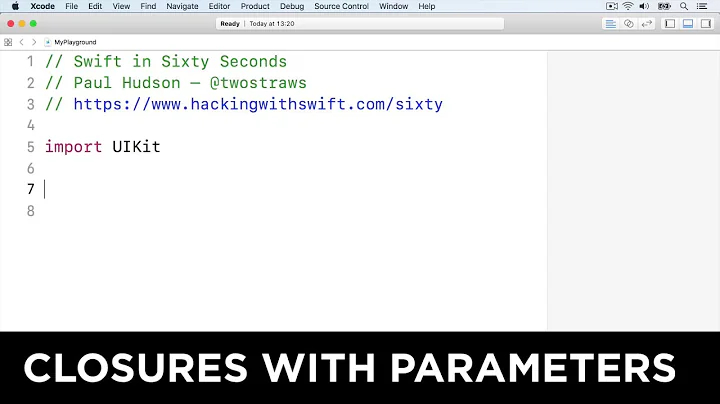Closure cannot implicitly capture a mutating self parameter
Solution 1
The short version
The type owning your call to FirebaseRef.observeSingleEvent(of:with:) is most likely a value type (a struct?), in which case a mutating context may not explicitly capture self in an @escaping closure.
The simple solution is to update your owning type to a reference once (class).
The longer version
The observeSingleEvent(of:with:) method of Firebase is declared as follows
func observeSingleEvent(of eventType: FIRDataEventType, with block: @escaping (FIRDataSnapshot) -> Void)
The block closure is marked with the @escaping parameter attribute, which means it may escape the body of its function, and even the lifetime of self (in your context). Using this knowledge, we construct a more minimal example which we may analyze:
struct Foo {
private func bar(with block: @escaping () -> ()) { block() }
mutating func bax() {
bar { print(self) } // this closure may outlive 'self'
/* error: closure cannot implicitly capture a
mutating self parameter */
}
}
Now, the error message becomes more telling, and we turn to the following evolution proposal was implemented in Swift 3:
Stating [emphasis mine]:
Capturing an
inoutparameter, includingselfin a mutating method, becomes an error in an escapable closure literal, unless the capture is made explicit (and thereby immutable).
Now, this is a key point. For a value type (e.g. struct), which I believe is also the case for the type that owns the call to observeSingleEvent(...) in your example, such an explicit capture is not possible, afaik (since we are working with a value type, and not a reference one).
The simplest solution to this issue would be making the type owning the observeSingleEvent(...) a reference type, e.g. a class, rather than a struct:
class Foo {
init() {}
private func bar(with block: @escaping () -> ()) { block() }
func bax() {
bar { print(self) }
}
}
Just beware that this will capture self by a strong reference; depending on your context (I haven't used Firebase myself, so I wouldn't know), you might want to explicitly capture self weakly, e.g.
FirebaseRef.observeSingleEvent(of: .value, with: { [weak self] (snapshot) in ...
Solution 2
Sync Solution
If you need to mutate a value type (struct) in a closure, that may only work synchronously, but not for async calls, if you write it like this:
struct Banana {
var isPeeled = false
mutating func peel() {
var result = self
SomeService.synchronousClosure { foo in
result.isPeeled = foo.peelingSuccess
}
self = result
}
}
You cannot otherwise capture a "mutating self" with value types except by providing a mutable (hence var) copy.
Why not Async?
The reason this does not work in async contexts is: you can still mutate result without compiler error, but you cannot assign the mutated result back to self. Still, there'll be no error, but self will never change because the method (peel()) exits before the closure is even dispatched.
To circumvent this, you may try to change your code to change the async call to synchronous execution by waiting for it to finish. While technically possible, this probably defeats the purpose of the async API you're interacting with, and you'd be better off changing your approach.
Changing struct to class is a technically sound option, but doesn't address the real problem. In our example, now being a class Banana, its property can be changed asynchronously who-knows-when. That will cause trouble because it's hard to understand. You're better off writing an API handler outside the model itself and upon finished execution fetch and change the model object. Without more context, it is hard to give a fitting example. (I assume this is model code because self.img is mutated in the OP's code.)
Adding "async anti-corruption" objects may help
I'm thinking about something among the lines of this:
- a
BananaNetworkRequestHandlerexecutes requests asynchronously and then reports the resultingBananaPeelingResultback to aBananaStore - The
BananaStorethen takes the appropriateBananafrom its inside by looking forpeelingResult.bananaID - Having found an object with
banana.bananaID == peelingResult.bananaID, it then setsbanana.isPeeled = peelingResult.isPeeled, - finally replacing the original object with the mutated instance.
You see, from the quest to find a simple fix it can become quite involved easily, especially if the necessary changes include changing the architecture of the app.
Solution 3
If someone is stumbling upon this page (from search) and you are defining a protocol / protocol extension, then it might help if you declare your protocol as class bound. Like this:
protocol MyProtocol: class {
...
}
Related videos on Youtube
coding_999
Updated on July 05, 2022Comments
-
coding_999 almost 2 years
I am using Firebase to observe event and then setting an image inside completion handler
FirebaseRef.observeSingleEvent(of: .value, with: { (snapshot) in if let _ = snapshot.value as? NSNull { self.img = UIImage(named:"Some-image")! } else { self.img = UIImage(named: "some-other-image")! } })However I am getting this error
Closure cannot implicitly capture a mutating self parameter
I am not sure what this error is about and searching for solutions hasn't helped
-
 pstued over 7 yearsIn what environment do you call FirebaseRef.observeSingleEvent . Is it called within a struct?
pstued over 7 yearsIn what environment do you call FirebaseRef.observeSingleEvent . Is it called within a struct? -
coding_999 over 7 yearsYes its called within a struct
-
 Mikael Weiss about 3 yearsThis seemed to work for me: .escapingFunction { [self] _ in self.someFunction }
Mikael Weiss about 3 yearsThis seemed to work for me: .escapingFunction { [self] _ in self.someFunction }
-
-
 redent84 about 7 yearsLast paragraph is important. Be careful with capturing
redent84 about 7 yearsLast paragraph is important. Be careful with capturingselfin@escapeblocks, you may end with retention cycles which may cause memory leaks. Better use[weak self](or[unowned self]if you're sure about the block lifecycle) in all@escapeblocks that captureself. -
Novellizator almost 7 yearsSoo, why is the problem solved with a reference type? Why is it any different?
-
 Islam over 6 yearsYes, but due to the nature of the value types now your
Islam over 6 yearsYes, but due to the nature of the value types now yourclosureSelf'spropertywill benewValueand your's won't change. Happy debugging. -
ctietze over 6 yearsYeah. Does not solve the problem but breaks the code instead.
-
Vijay Vepakomma about 6 yearsI initially got around it by setting
var _self = self and setting_self.property`. I will try this solution.
